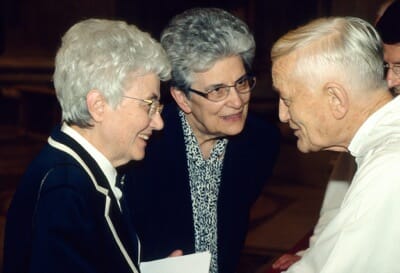
Chiara Lubich, Gabri Fallacara, Frère Roger Schutz (1978).
at
Taizé in Burgundy where the Council of Youth was being held.
Chiara Lubich asked me to attend with several French young people from our Movement. The 40,000 attendees were welcomed by large wooden signs with the word “Silence” written in various languages. It was a simple and direct way to introduce us into the atmosphere of prayer and dialogue among everybody, a ‘creative space’ as Brother Roger called it: no smoking or alcohol, only prayer and dialogue among all, trust and freedom.
There were Catholics, Protestants, Anglicans, Orthodox, Jews, agnostics . . . a composition that mirrored that of the brothers living with Brother Roger, who was a Reformed Calvinist. Schutz was always around. With his sweet and humble features that seemed to speak of God, he greeted each and every person. When he heard that Chiara had sent us, he held my hand and said:
“I’m happy to see you here; tell Chiara that I carry her in my heart.” In another moment he said: “Give Chiara an embrace on my behalf.” The final declaration contained the strength and commitment of all to living out the Beatitudes and being ‘seed of society without classes and without privileges.” It gave us a boost to live beyond our dreams, to live in peace and harmony.”
Was that the first time the Prior of Taizé met anyone from the Focolare Movement? “No. His first encounter with the Focolare was in the 1950s. He spoke of it himself in the preface to the book
Méditations by Chiara Lubich, published in Paris in 1966: “It was more than ten years ago that I welcomed some young men and women to Taizé. I listened to them with tranquillity and the more I heard, the more I recognized the light of Christ in them. Who were those young people? The focolarini. Then we met again several times, not only at Taizé, but in Rome, Florence, Milan and elsewhere, and it was always the same light of Christ.
One day that I was in Rome, I invited Chiara Lubich over, the one who had founded this spiritual family of focolarini.
That encounter remains memorable. Then I saw Chiara often, and the transparency of this woman is always the same page of an opened Gospel. I never forget that Chiara had been chosen from among the humble, the worker, to confuse the strong, the powerful of this world. I know that through a woman like Chiara, God gives us an unparalleled instrument of unity for us Christians separated for centuries by a long and drawn out divorce.”

Chiara Lubich, Eli Folonari,
“Those words from the preface reveal the understanding that Roger had with regards to Chiara as an instrument of unity, for the reconciliation among Christians of different denominations that he also longed for.
Chiara always held him in high esteem, also offering concrete support for his work. For example, she asked a focolarino to work for one year in the organization of the Youth Council. Later we collaborated in the
Together for Europe project, which Roger so much supported. The Taizé Community has always been very present in the different manifestations, and it will also be there for the one that’s being prepared in Monaco for 2016.
It was the first time that Movements from different Churches agreed to grow together in the Gospel life. Since each one will include many people, this innovation has handed over to history something very significant that does not go unobserved.”
Since you knew him personally, what can you tell us about Brother Roger as an ecumenical figure? “With Brother Roger a new era was inaugurated. You prayed for each other, you shared with each other. Roger Schutz leaves us a message of assurance. He began his work by gathering refugees and the suffering, putting together so many young people. During his long life – he lived to be 90, had a special death as we all know – he really experienced the Father’s love for humanity. He was the transparent reflection of this Divine Love. For him prayer was a key that allowed you to, I would almost say, unlock the mystery of God and Roger had this Divine sense of prayer, outside of time.
He believed in the unity among Christians, he believed in it completely. So he set out to do with other people what could be done immediately: praying. Unity will be a gift from God.”




0 Comments